Immigration

Tonight, faith leaders and all those who have spent years trying to fix our broken immigration system should feel gratitude toward President Obama. In a primetime address to the nation, the president announced he was taking executive action to relieve some of the suffering caused by the failures of the status quo. Millions of families will no longer live under the daily threat of having their lives torn apart by senseless deportations, which is something all Christians – whether Republican or Democrat – should celebrate. Many of our brothers and sisters in Christ, who have spent significant portions of their lives hiding in the shadows, can now enjoy the flourishing God intends for us all. Their joy and well-being must inform our judgments of the president’s action, especially in light of the biblical call to “welcome the stranger.”
Unfortunately, the president’s compassionate actions are creating a political firestorm among some Republicans in Washington. Their anger and antipathy toward the White House are blinding them to the positive effects these measures will have for our society. Even after decades living and working in our nation’s capital, I’m still amazed at the many ways political ideology can prevent us from having “eyes that see” and “ears that hear.” I lament that our political discourse has come to this.
Everyone agrees the only way to find sustainable, long-term solutions is through Congress passing bipartisan legislation. The Senate did exactly that more than 500 days ago, but their honest efforts have languished in the House of Representatives because of Republican intransigence. GOP leaders promised alternative policy ideas; reform garnered widespread, nationwide support — including among a majority of Republicans; faith leaders were hopeful after countless positive conversations with members of Congress; the president even told me that he was “optimistic” about reform after conversations with Speaker John Boehner; the country, and, more importantly immigrant families, patiently waited — yet, the House failed to act.

Yesterday, President Obama released a short video providing more information on a much-anticipated executive action announcement on immigration policy. While the details remain unclear on how many of the 11 million undocumented and aspiring Americans will be covered, relief is rumored to the following:
- Temporary legal protection for undocumented parents of children who are legal U.S. citizens.
- Temporary legal protection for undocumented immigrants with a longstanding presence in the United States.
- Extension of the 2012 Deferred Action for Childhood Arrivals (DACA) program.
The president will address the nation tonight at 8 p.m. ET. Watch the speech live here.

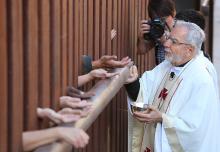
The nation’s Catholic bishops are jumping into the increasingly contentious battle over immigration reform by backing President Obama’s pledge to act on his own to fix what one bishop called “this broken and immoral system” before Republicans assume control of Capitol Hill in January.
In an unscheduled address Nov. 11 at the hierarchy’s annual meeting, Seattle Auxiliary Bishop Eusebio Elizondo, chairman of the migration committee of the U.S. Conference of Catholic Bishops, said the USCCB would continue to work with both parties to pass comprehensive immigration reform.
But, Elizondo said, given the urgency of the immigration crisis and the electoral gains by Republicans who have thwarted earlier reform efforts, “it would be derelict not to support administrative actions … which would provide immigrants and their families legal protection.”
“We are not guided by the latest headlines but by the human tragedies that we see every day in our parishes and programs, where families are torn apart by enforcement actions especially,” he said.
During the summer, the president was moving toward unilateral action on immigration, despite warnings that such moves could exceed his constitutional authority or would turn voters against reform.
Then in early September, Obama said he would delay acting on his own, a move that was seen as a way to protect vulnerable Democrats from any backlash in midterm elections. On Sunday, Obama told CBS’ “Face the Nation” that he was now “going to do what I can do through executive action.”
“It’s not going to be everything that needs to get done. And it will take time to put that in place,” he said.

Think about this: why would anyone travel thousands of miles on a journey that many do not survive — except for the hope that their destination (the U.S.) is significantly safer than where they currently live? I cannot imagine taking such risks unless my current circumstances left me with no other options besides death. I have met many people who are undocumented in the U.S. They are not criminals. They are not economic threats. They are mothers and fathers, aunts and uncles, and sometimes teenagers trying to escape untold violence and oppression. They are our neighbors, community members, and friends. They are people simply trying to do what it takes to survive.
Our immigration system is broken. It is hard for anyone to say otherwise. But I think our values are broken too. When gun-toting vigilantes are able to successfully threaten buses full of children put at risk by their parents because it was a better option than staying at home, something is desperately wrong with our values. We can say their home country needs to get its act together, but that does not address the hostile response in the U.S. by some people. Politics aside, the morality of refusing such people violates the values of both my Christian faith and my understanding of how my country was founded by persecuted refugees seeking freedom.
Comprehensive immigration reform is about real people with real blood flowing through real veins. It is not about numbers, other than the fact that the U.S. grants the lowest number of visas to the countries with some of highest homicide rates in the world — violence that the U.S. government has had a hand in creating over the past several decades. This is not about following the law, because our current immigration laws are simply unjust and violate the values upon which this country was founded: a country of immigrants in which “all people are created equal.” It is about God’s children desperately seeking refuge in a country that boasts itself as the “land of the free” and the land of hope and promise.

Editor's Note: Jarrod McKenna is an Australian Christian leader behind #LoveMakesAWay, a movement of Christians seeking an end to Australia's inhumane asylum seeker policies through prayer and nonviolent love in action. Read more about McKenna, #LoveMakesAWay, and the indefinite imprisonment of immigrants in Australia HERE. This article originally appeared at Junkee.
If you care about the cause of asylum seekers in Australia, you know there’s not been much to cheer about lately – the government descends further into cruelty, while much of the populace just shrugs.
So when a group of priests and pastors were arrested for peacefully occupying the Sydney offices of immigration minister Scott Morrison in March, praying and demanding the release of kids in detention, it turned a few heads and went a bit viral. When it happened again and again in the following months, it felt like a movement. To date, more than 100 leaders from many different faiths have been arrested at Love Makes A Way prayer vigils in politician’s offices all over the country (the PM wasn’t spared; his digs were targeted in May).
The charmingly polite stubbornness with which they’ve taken the government to task has earned many supporters of all persuasions, even if the prayer bit is lost on some of them. Along with other “cranky Christian” activists like Gosford Anglican Church’s Father Rod Bower (he of the irrepressible message board) and rogue Catholic priest and Triple J presenter Father Bob, they’ve been a pain in the conservative arse even an atheist could love.
One of the main minds behind Love Makes A Way is Perth-based radical Christian leader Jarrod McKenna. With his blond dreadlocks, casual vibe, and jokes about how Christians are “daggy,” he’s hardly the sanctimonious, Bible-bashing type. But when the subject of human rights and nonviolent resistance comes up, the charismatic McKenna becomes passionate, even evangelical.

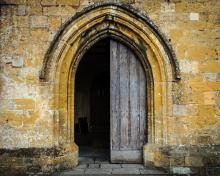
Zach Szmara, Pastor of The Bridge Community Church in Logansport, Ind., was on a conference call when a young man entered the church. He put the call on hold to walk out of the office and meet him. In broken English, the man said, "Are you the people that help immigrants?" The man had driven more than 20 miles because he heard rumors of a church that loved the stranger.
Szmara said, "In that moment I was both humbled and convicted. I was humbled that our small church had such a reputation. Yet I was convicted that it was only very recently that I could answer 'yes' to the burning question of this young immigrant who came to me."
"I have lived overseas, and there my eyes could easily see the marginalized and the stranger in my midst. But at home in the states, I almost missed it, and almost missed how God has enriched my life because of it," Szmara continued.
The issue of immigration has dominated the headlines for much of this year. As Christians, we believe that – regardless of where we each may stand on the political spectrum – God’s heart for the immigrant is clear. In fact, the Hebrew word for an immigrant appears 92 times in the Old Testament alone, and the New Testament says in no uncertain terms that however we, as Christians, treat the stranger in our midst, is how we are treating Jesus himself.

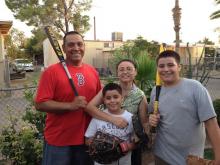
On Aug. 7 we lit a single white candle at the prayer service welcoming Rosa Robles Loreto into sanctuary at Southside Presbyterian Church in Tucson, Ariz. Almost 90 days later, that candle has been joined by five others, representing Luis Lopez Acabal, Beatriz Santiago Ramirez, Francisco Aguirre, Francisco Perez Cordova, and Arturo Hernandez. We are grateful that Beatriz was just granted a stay so that she could return to her home with her two small children, but the rest all remain in sanctuary.
As we approach Rosa’s 90th day in sanctuary, its time to replace the nearly burned down candle, but the light of radical Christian hospitality continues to not only burn bright, but spread throughout the nation.
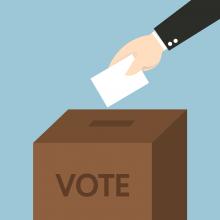
While much of the country was receiving election returns and news of a red tide sweeping across the nation, here in Oregon we have more of a white, black, and brown problem.
One way to look at Oregon was that the “progressive” blues all won — our Democratic incumbents were all re-elected for U.S. Congress and governor, and statewide measures to legalize the sale and use of recreational marijuana sailed to an easy victory.
So, from a distance it looks like the dream of the Bill Clinton 90s is still alive in Portland.
I’ve been here more than a year now, planting a church and beginning to work with neighborhood partners, and have come to realize that the dream for truly “progressive” values — like immigration reform and bridging the gap in ever increasing income inequalities — is more like a bad dream that won’t go away.

On Sept. 25 Francisco Córdoba entered into Sanctuary at St. Francis in the Foothills United Methodist Church in Tucson, Ariz., after the threat of deportation had been looming over his family's life for eight long months.
It has been an honor for those of us here at St. Francis to receive the blessing of Francisco and his family and to offer them a place where they can begin to see a solution to our broken immigration system. It was even more important that we receive the amazing blessing that they bring to us.
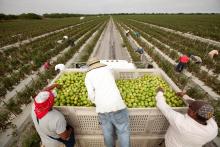
There is an ancient Sanskrit mantra — Annam Brahma — which Indian sages and seers of the hoary past uttered before taking their daily bread. That mantra, which originated thousands of years ago, is translated as “Food is God.” The modern Indian mystic Sri Chinmoy said, “Food gives us new life; it energizes us. Anything that energizes us is life — the stream of life — and life is God.”
This mantra suggests that without food, men and women would not have the energy to pursue their quest for the truth, for light, for God. Food enables our journey to self-discovery and God-discovery. Therefore we are grateful for our food, for it takes us home, to our Source.
Nearly every faith tradition places a spiritual significance on food — from animist religions that celebrate the harvest to Christianity’s taking of the sacrament —symbolizing the sacrifice of Jesus. We link these ritual acts of feeding our bodies to the feeding of our soul through gratitude and remembrance.
It is incredibly apt that this year’s Food Day is dedicated to farmworkers, who occupy the invisible base of our nation’s food system. I use the word “invisible” because if we truly comprehended the abuse they endured, both spiritual and physical, we would rise resolutely in defense of their rights.
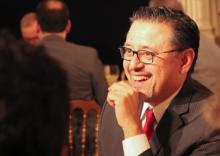
An alliance of evangelical organizations has pledged to dramatically increase the number of church-based legal clinics across the country to assist immigrants with the complicated processes of seeking green cards, visas and family unification.
The Immigration Alliance, a network of 15 evangelical denominations and ministries, on Oct. 21 launched a plan to reduce the gap between the 22 million immigrant noncitizens and the 12,000 private immigration lawyers in the country.
“Churches are a trusted presence in immigrant communities that can — and should — help address this critical shortage of legal services,” said Noel Castellanos, the alliance’s board chair and the CEO of the Christian Community Development Association, in announcing the new venture.
The alliance, which was formed in 2013, estimates that there also are 2,800 nonprofit attorneys and accredited staff in the country. The umbrella network includes the National Association of Evangelicals, the Assemblies of God, the Church of the Nazarene and the National Latino Evangelical Coalition, among others.
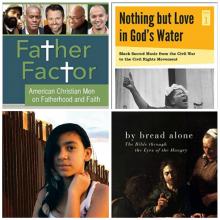
Paternal Insights
Father Factor: American Christian Men on Fatherhood and Faithoffers diverse perspectives from men under 40 who are rooted in a broad spectrum of Christian traditions, ethnicities, and backgrounds. Edited by R. Anderson Campbell, this is the fifth volume in the I Speak for Myself series. White Cloud Press
Sing Freedom
In Nothing but Love in God’s Water: Volume I, Black Sacred Music from the Civil War to the Civil Rights Movement, gospel music scholar Robert F. Darden explores the sustaining and revolutionary power of sacred song in African-American history. Penn State Press

Unknown to most, sanctuary is actually one of the most ancient traditions we have as a people of faith. In the late Roman Empire, fugitives found refuge in early Christian churches; in medieval England, churches protected accused wrongdoers; and in the years before the Civil War, people of faith organized the Underground Railroad to help slaves flee the South. In the 1980s, nearly 500 congregations practiced sanctuary in an attempt to shelter the hundreds of Central Americans fleeing brutal violence in Guatemala and El Salvador.
Currently, the Sanctuary Movement allows members of congregations who are facing deportation to reside within the sacred space of a church, synagogue, or mosque in order to avoid immediate deportation from the Immigration and Customs Enforcement (ICE) agency. Although the ICE is not legally banned from entering churches or schools, custom is to avoid such sensitive areas unless a suspected terrorist or dangerous felon is involved.
Today there are currently 5 active sanctuary cases, along with 30 congregations who are offering sanctuary in Arizona, Colorado, Illinois, Washington, Maine, and Oregon. The Sanctuary Movement is important because it breaks down the polarized, politicized, and dehumanized aspects of immigration reform and looks instead to Christ as a model for loving one’s neighbor.
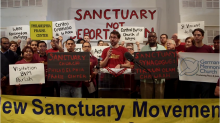
BREAKING NEWS:
There is a nonviolent uprising around immigration happening in Philadelphia and a dozen other U.S. cities. Philadelphia faith leaders announced that they will welcome immigrant families even if it is against the law. They are building a movement of "sanctuary congregations" and have dreams that the U.S. will one day be a sanctuary nation.
We join them in insisting that we must obey the laws of God over the laws of our government — and that means "welcoming the foreigner as if they were our own flesh and blood." (Exodus 22:21, Lev.19:34, etc., etc.).
Jesus says that when we welcome the stranger we welcome him. When God asks: "When I was a stranger did you welcome me?" (Mt. 25) we are not going to say: "Sorry God, Congress wouldn't let us."
We know that sometimes divine obedience can mean civil disobedience.
As St. Augustine once said: "An unjust law is no law at all."
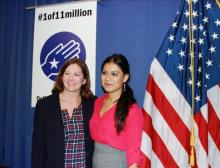
I absolutely love to read, and anyone who is familiar with Oscar Wilde I’m sure recognizes the quote I have chosen for my title; “To define is to limit.” From the moment I read this in The Picture of Dorian Gray, I thought to myself: this is me; this is how I see the world. Now I know people argue with this quote because a definition is a precise statement of what a word means. But just think of “define” as “label.” When you put a label on someone, you classify and constrict them, which limits them from breaking out their true potential.
For example, when we are constantly talked about as illegal aliens, we are given the image of harsh criminals. This image affects our self esteem and our confidence. Some, like Aly Wane, start to believe that there is something evil inside of them. It also limits us from reaching out to the American people and proving to them that we are not here to cause any harm. We only want the opportunity of seeking a brighter future. We are not criminals. We have done what we had to do, what any human would do, to seek a violence-free life, to keep our families together, or, like me, to pursue an education. I am one of 11 million, and each one of us has a different story to tell.

